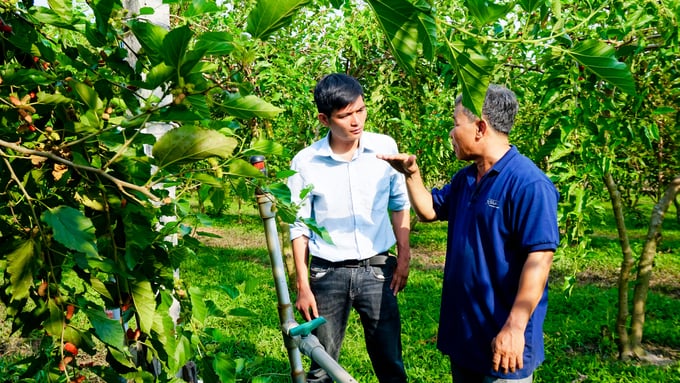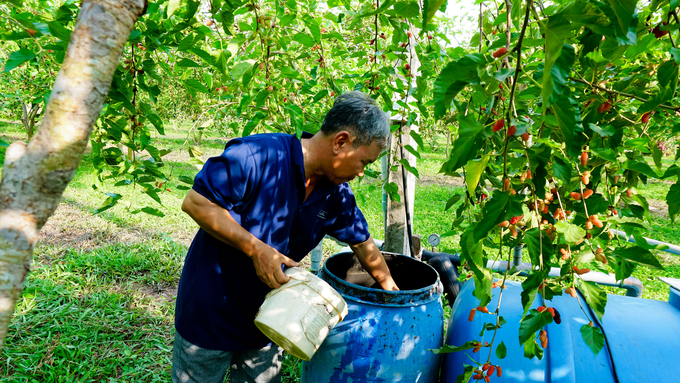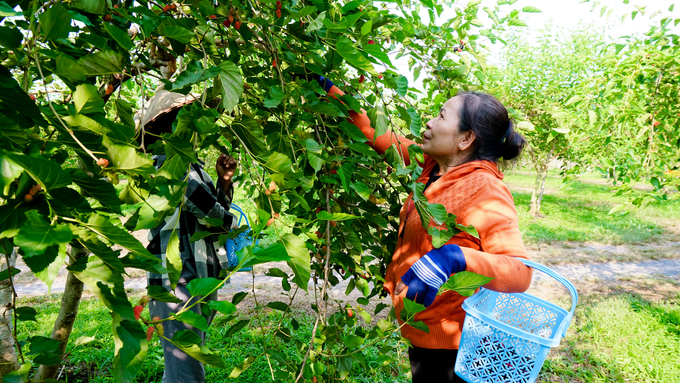June 17, 2025 | 03:19 GMT +7
June 17, 2025 | 03:19 GMT +7
Hotline: 0913.378.918
June 17, 2025 | 03:19 GMT +7
Hotline: 0913.378.918
Born and raised in Tay Ninh, Mr. Nguyen Thanh Vu was once an agricultural engineer with over 15 years of experience in the fertilizer and agricultural supplies sector at a joint venture between Japan and Vietnam. This working environment provided him with numerous opportunities to engage with Japanese agriculture and farmers. Through these interactions, Mr. Vu realized that Vietnamese agriculture in general, and that of Tay Ninh in particular, still has much work to be done.

Mr. Vu (right) shares Japanese organic farming secrets with reporters. Photo: Le Binh.
According to Mr. Vu, the land resources available for agricultural development are very limited, forcing the Japanese to research and apply modern techniques to optimize land and water use. Additionally, the people of cherry blossom country have a deep respect for nature, so when they plant any type of crop, they consider its survival. Japanese farmers will reserve 5 - 10% of their yield for wildlife, such as birds and animals.
“In this 'strict' country, counterfeiting, imitation and substandard products are strictly prohibited and heavily penalized, often leading to social ostracism. They believe that those individuals deserve appropriate punishment. Therefore, the Japanese market has virtually no harmful products. Agricultural products are of high quality and yield, meeting domestic demand and exporting to discerning markets like the U.S. and the EU", Mr. Vu shared.
Armed with knowledge and practical experience, along with a strong desire to provide consumers with clean products and enhance profitability in agricultural production, Mr. Vu left behind his job with a salary of a thousand dollars - one that many people dream of - to embark on the journey of organic farming and clean agricultural products in 2018.

Mr. Vu utilizes waste and by-products from his garden to compost organic fertilizer. Photo: Tran Trung.
As he guided us through his organic mulberry garden in Tan Hung commune (Tan Chau district, Tay Ninh), Vu explained his choice to cultivate mulberries. This plant is easy to grow, adaptable to various soil conditions and also serves as a valuable medicinal herb with numerous health benefits, such as calming the nerves and alleviating joint inflammation. Mulberry trees bear fruit year-round, with a sweet and tangy flavor that is not only delicious but also helps to cool the body, detoxify and promote overall health.
Currently, Mr. Vu's mulberry garden has over 1.000 nearly five-year-old mulberry trees, grown according to the circular organic process based on Japanese standards across a 2-hectare area. Impressively, Mr. Vu's garden also nurtures and protects earthworms, creatures likened to hardworking plowmen, which keep the soil loose and fertile.
"I spent two years improving the soil and decided to cultivate the trees entirely using organic methods. After three years of planting, the mulberries now produce sweet fruit, with each year's yield surpassing the last, while production costs have inversely decreased. Depending on the season, we harvest around 50 kg of fruit daily, with some days reaching up to 100 kg. Most of the harvest is sold in the Ho Chi Minh City market, while the rest is processed into products like syrup and mulberry jam, which we sell locally", Mr. Vu shared.
In recent years, Tay Ninh's tourism industry has gradually established its position, attracting a large number of both domestic and international visitors. With Ba Den mountain as the focal point, Tay Ninh's tourism sector has been working with various organizations to gradually develop tourism models connected with agriculture. Initial results indicate that this approach is promising, meeting the growing demands of tourists. Ba Phong mulberry garden, owned by Mr. Vu, has become an ideal destination for many travelers visiting Tay Ninh.

Visitors enjoy the experience of picking and tasting mulberries right in the garden. Photo: Le Binh.
According to Mr. Vu, in the fast-paced, high-pressure world we live in, people increasingly seek out experiences that help them restore balance in both mind and body, making eco-tourism a growing trend.
Since the mulberry garden started yielding fruit, many visitors from both within and outside the province have come to visit and experience it firsthand. People are genuinely delighted by the fresh, cool atmosphere at Ba Phong mulberry garden. Here, they can learn about the organic farming process, experience picking mulberries and even enjoy tasting them for free right in the garden.
Especially for families with young children or students looking for educational experiences, beyond being introduced to various fruit trees, they also receive guidance on how to care for plants, respect the environment and protect the ecosystem around them, all aimed at fostering a greener future.
While we were immersed in the mulberry garden, we came aacrossMr. Nguyen Phong Tran, a teacher from the Center for Conscious Education in Tay Ninh City, who had brought a group of nearly 20 students to visit and experience Ba Phong mulberry garden.
Mr Tran said: “We want the students to have an authentic agricultural experience. At the mulberry garden, they can dig in the soil, plant trees, pick fruit and eat it right in the garden without worrying about pesticides. In addition to learning about organic farming and clean produce, both teachers and students can enjoy playing and exploring the garden and even take home some fresh mulberries and mulberry-based products as gifts".

Agricultural tourism is a promising direction in Tay Ninh. Photo: Le Binh.
According to Mr. Vu, each hectare of mulberries generates about 8.200 USD in revenue, with a profit of around 4.100 USD/year. Building on these results, he plans to continue investing in a circular organic farming model based on Japanese standards to meet the demand of tourists visiting Tay Ninh.
Commenting on the agricultural tourism model, Mr. Ha Thanh Tung, Director of Tay Ninh’s Agricultural Promotion Center, stated that Tay Ninh possesses significant advantages in tourism, with agricultural tourism being a highly potential model. However, it has yet to be fully tapped into in Vietnam in general and in Tay Ninh specifically. Investors are beginning to recognize this potential and are gradually shifting towards this type of tourism. In the near future, agricultural tourism is expected to develop in line with these growing expectations.
"Ba Phong organic mulberry garden is considered one of the many new tourism products that Tay Ninh finds suitable and effective. We are actively collaborating and supporting businesses to connect and create products that will attract tourists in the near future. Hopefully, with the meaningful and successful approach of this mulberry garden, more eco-tourism models combined with agricultural tourism will emerge, bringing new and unique offerings to Tay Ninh to draw in visitors from near and far", Mr. Ha Thanh Tung shared.
Translated by Phuong Linh
/2025/06/12/3721-2-202745_83.jpg)
(VAN) TH made an impression at Seoul Food 2025 with its line of natural beverages, paving the way for Vietnamese food products to enter the South Korean market.

(VAN) Soc Trang's success in rice exports stems from a strategy of developing fragrant and specialty rice cultivation areas and standardizing production toward low-emission practices.
/2025/06/11/1311-5-120811_839.jpg)
(VAN) The pig farming industry is facing the challenge of comprehensive restructuring to meet requirements for quality, safety, traceability, and market expansion both domestically and for export.

(VAN) Vietnam considers participating in ALGROALBA in order to expand agricultural production, coordinate the assessment and effective exploitation potential land.
/2025/06/05/5314-1-184727_407.jpg)
(VAN) From seemingly worthless fish scales and skin, enzymes and lactic ferments can transform by-products into peptides, opening a sustainable, effective business direction and elevating Vietnamese seafood.

(VAN) TTC AgriS and IFC signed a strategic partnership to develop a sustainable agricultural value chain, aiming to achieve the Net Zero target by 2035.

(VAN) Seafood by-products are opening a new path, combining green growth and technological innovation to enhance the industry's value.